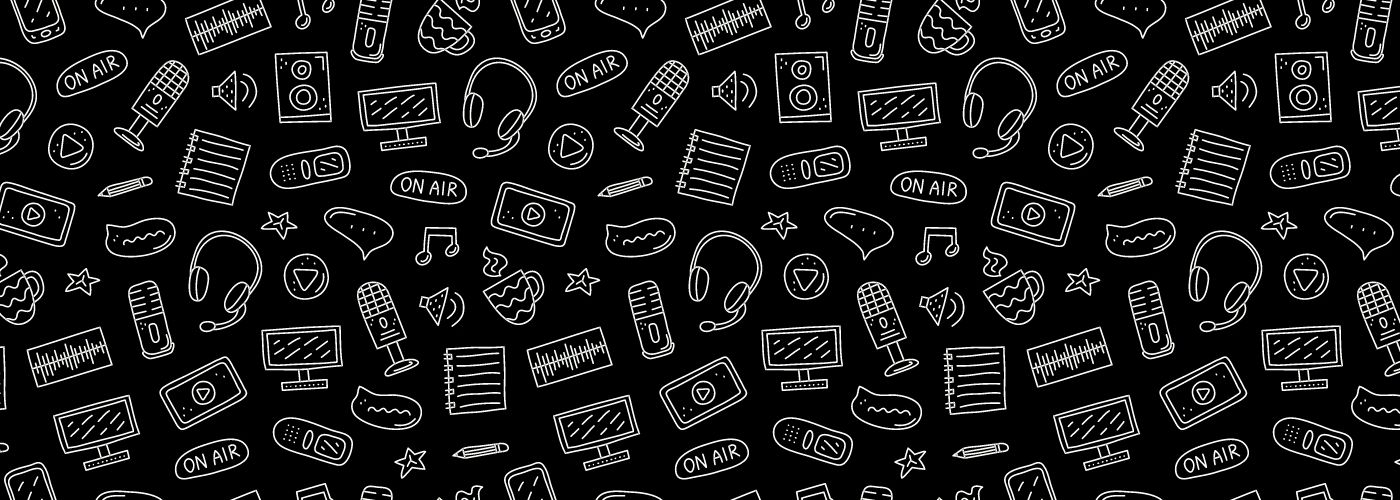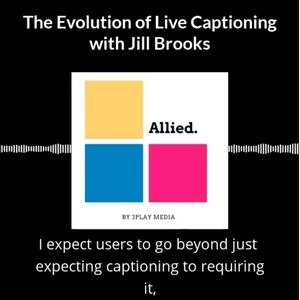How to Start a Podcast: Allied as a Framework
Updated: February 24, 2022
Download the Checklist: How to Start a Podcast
If you’re wondering how to start a podcast, then you’re in the same position we were in not too long ago.
3Play Media has always valued the power of meaningful content. From a robust webinar program to our consistently updated blog, we are proud to be a resource and authority in media accessibility.
With the proliferation of podcasts, we were eager for a new outlet to share knowledge and amplify other voices in the accessibility space. So in April 2021, we launched our very own podcast called Allied.
While we’re learning how to improve Allied every day, we’re proud of our progress and excited about the future. This blog will go over our journey with Allied as a framework for how you, too, can start a podcast.
Preparing to Start Your Podcast
At the beginning of 2021, we tinkered with the idea of starting a podcast. We had plenty of ideas for guests and conversations, but we needed to plan and prepare before hosting our first interview.
We also needed to answer our why.
Why create a podcast when we already had other content channels? For us, the answer was multifold. Podcasting would allow us to reach a different audience from our usual webinar attendees, newsletter subscribers, and blog visitors. It would also create an opportunity to share ideas more freely and have conversations with leaders in the accessibility field.
Besides figuring out our why, we needed to answer these questions:
- What is the overarching theme of our podcast? We knew we wanted to create a podcast about accessibility, but we needed to figure out how to differentiate ourselves from other shows. We needed a theme that would connect each episode while also allowing us to explore many facets of accessibility.
- What will we name our podcast, and how will we design a logo? We needed a catchy and meaningful name that fit 3Play Media’s brand. While we wanted Allied to be a unique content program, it needed to fit appropriately within our larger company goals and voice. We also needed to make our logo accessible. Our brand system addresses accessible typefaces and color contrast, so it was simple to create our podcast art with accessibility in mind.
Allied logo
- What format will we use for our show? We landed on a conversational interview format that creates a natural back and forth between our host and guest. This format is one of the key differentiators between Allied and our other content channels. When choosing a format, keep in mind that your decision will inform the tools and workflows you use during production.
- What is the goal of our podcast? As a video accessibility company with other content channels, we needed to learn where a podcast could fit within our content ecosystem and its role as an educational resource and potential sales tool. While our goals have shifted over time, it was helpful to have a starting point upon which we could build.
- Who is our target audience? Answering this question helped us determine where to market our show, what kinds of guests and topics to feature, and the types of questions to pose.
- What hosting provider will we use? Different hosting platforms provide various analytics, transcription options, special features, and more. It was essential for us to choose a hosting platform that permitted transcripts, a vital piece of podcast accessibility. We use Wistia as our hosting provider, as it offers easy integration with 3Play Media’s transcription services.
- How will we prioritize accessibility? The podcast industry has been slow to implement accessibility. Many shows don’t offer transcripts, accessible websites, or publish with accessible media players. These are some of the most basic ways to improve podcast accessibility, yet they’re not commonplace. Central to 3Play Media’s services is the belief that access to media and information is vital to an equitable world. To this end, we’re striving to produce a podcast that as many people as possible can enjoy. This commitment means providing transcripts for every episode, ensuring our website is accessible, offering alternative methods for consuming podcast content, providing clear audio recordings, and using accessible marketing.
- Who at 3Play Media will work on the podcast? We needed a host who could commit to monthly interviews and a producer to manage our production schedule, guest bookings, research, and promotion.
Additionally, we needed to devise a realistic publishing schedule, purchase recording equipment, and choose our editing software and intro and outro music.
We recommend considering the above questions if you plan on starting a podcast. While your answers can change over time, having a solid foundation is helpful in the beginning stages for determining some initial measures of success.
Launching Your Podcast
Once we were ready to launch Allied, we needed to promote our show. We created a landing page and social media accounts and started teasing episodes to anticipate our launch.
A few months before our official launch, we conducted our first interviews with Thomas Tobin, Emily Yates, and Derek Mei to release three episodes at once. Releasing multiple episodes allowed us to give listeners substantial content with our launch and helped propel our early marketing efforts.
Learn How to Launch a Podcast [Free Checklist]
Growing Your Podcast
After getting Allied up and running, we committed to sticking to a publishing schedule, which involves research, communication with guests, interviewing, editing, transcription, and promotion. Sticking to a schedule helped guide our project management and gave our listeners consistency in expecting new content.
As Allied continues to grow and evolve as one of our core content channels, we’re tracking our progress and learning more about finding new listeners and developing better content.
Here are a few of the ways we’re approaching growth in 2022:
- Conduct surveys with listeners to learn more about our audience, their interests in accessibility, and their constructive feedback on Allied.
- Track analytics across podcasting platforms. Analytics is the basis for understanding how people listen to a podcast and where we need to focus our efforts on improvement. The decentralization of podcasting makes tracking analytics challenging, as numbers differ across every listening platform, and each platform provides different information. We track our podcast month-to-month and are continuously learning which pieces of information are most valuable and how we can use analytics to provide insights for growth. We also track analytics on our website to learn how our transcripts are used and what actions people take on an episode’s landing page.
- Create dedicated landing pages for each episode. We provide transcripts underneath each embedded audio track for all episodes on our website. Listeners can easily find episode transcripts on our website rather than navigate our hosting platform.
- Develop a social media strategy that brings in new listeners. It’s simple to publish social content when we release a new episode, but we’re working on using social media consistently to drive new listeners to Allied through audiograms, repurposed content, and more. When developing a social media strategy, be sure to include accessibility through captions on audiograms, alternative text on repurposed content, and accessible formatting and design.
Allied: The Podcast for Everything You Need to Know About Web and Video Accessibility
If you’d like to listen to Allied, you can find us on Spotify, Google Podcasts, and Apple Podcasts. For transcripts, visit our website. Stay tuned for monthly episodes, and feel free to reach out with questions, feedback, or guest ideas at [email protected]. We’d love to hear from you.








